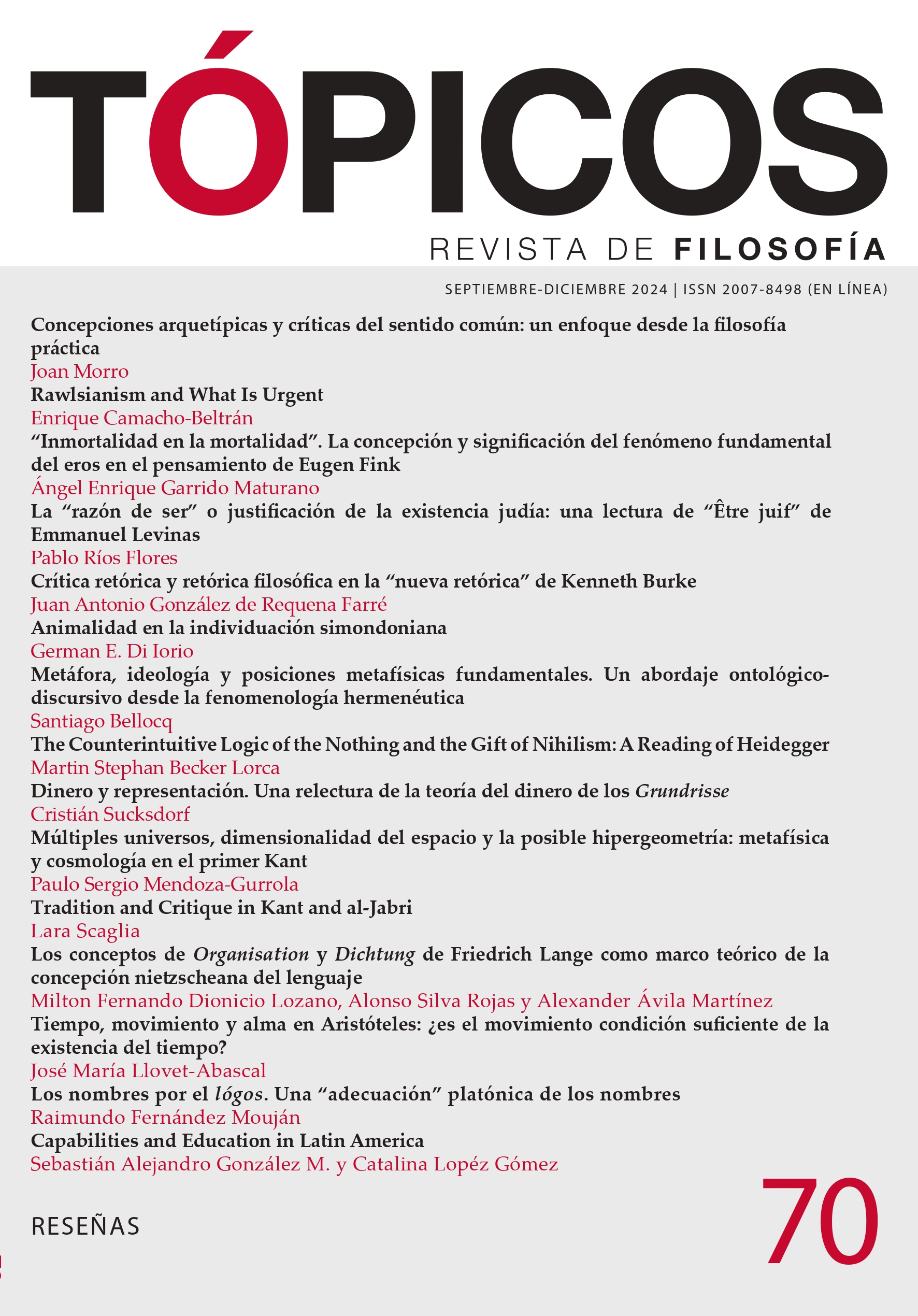Pubblicato 2024-08-15
Parole chiave
Come citare
Copyright (c) 2024 Tópicos, Revista de Filosofía

Questo lavoro è fornito con la licenza Creative Commons Attribuzione - Non commerciale - Non opere derivate 4.0 Internazionale.
Downloads
Altmetrics
Citas
Abstract
In Justice as Fairness: A Restatement, Rawls asserted that his conception of justice should provide guidance for a non-ideal theory of real-world injustices. Nonetheless, he established at the same time an enigmatic limit to his framing in which neither political philosophy nor justice as fairness should be understood as applied approaches. It is unclear how guidance against real-world injustices is possible, since it would presumably require insights into applied ethics. This paper focuses on drafting a possible alternative by offering a partially comprehensive reconstruction of the reasonable as a virtue. The hope is to use the virtue of reasonable citizens to transfer Rawlsian ponderations into a special kind of applied ethics controversies concerned with urgent public debates and resistance politics. The idea of this construction is to allow the virtue of the reasonable to establish a standard for citizen conduct.
Riferimenti bibliografici
- Anderson, E. (2014, February 11). Social Movements, Experiments in Living, and Moral Progress: Case Studies from Britain’s Abolition of Slavery. The Lindley Lecture at the University of Kansas. URL: http://hdl.handle.net/1808/14787.
- Bureau of International Labor Affairs. (2022, September 28). List of Goods Produced by Child Labor or Forced Labor. URL: https://www.dol.gov/agencies/ilab/reports/child-labor/list-of-goods-print.
- Caney, S. (2012). Just Emissions. Philosophy & Public Affairs, 40(4), 255-300. DOI: https://doi.org/10.1111/papa.12005.
- Clayton, M. & Stevens, D. (2014). When God Commands Disobedience: Political Liberalism and Unreasonable Religions. Res Publica, 20(1), 65-84. DOI: https://doi.org/10.1007/s11158-013-9221-y.
- Cohen, G. A. (2008). Rescuing Justice and Equality. Harvard University Press.
- Dewey, J. & Tufts, J. H. (1981). Ethics. Southern Illinois University Press.
- Friedman, M. (2000). John Rawls and the Political Coercion of Unreasonable People. In V. Davion & C. Wolf (eds.), The Idea of a Political Liberalism: Essays on Rawls. (pp. 16-33). Rowman & Littlefield Publishers.
- Fueller, L. L. (2012). Burdened Societies and Transitional Justice. Ethical Theory and Moral Practice, 15, 369-386. DOI: https://doi.org/10.1007/s10677-011-9300-0.
- Kelly, E. & McPherson, L. (2001). On Tolerating the Unreasonable. Journal of Political Philosophy, 9(1), 38-55. DOI: https://doi.org/10.1111/1467-9760.00117.
- Macedo, S. (1995). Liberal Civic Education and Religious Fundamentalism: The Case of God v. John Rawls? Ethics, 105(3), 468-496. DOI: https://doi.org/10.1086/293723.
- Mandle, J. & Reidy, A. D. (2003). A Companion to Rawls. Wiley-Blackwell.
- Mill, J. S. (2018). The Subjection of Women. Routledge.
- Miller, D. (2011). Taking up the Slack? Responsibility and Justice in Situations of Partial Compliance. In Z. Stemplowska & C. Knight (eds.), Responsibility and Distributive Justice. (pp. 230-245). Oxford University Press.
- Newton, J. (1788). Thoughts upon the African Slave Trade. J. Buckland and J. Johnson.
- Newton, J. (1830). Narrative of Some Remarkable and Interesting Particulars in the Life of the Rev. John Newton. Glasgow.
- Puddifoot, K. (2017). Epistemic Discrimination. In K. Lippert-Rasmussen (ed.), The Routledge Handbook of the Ethics of Discrimination. (pp. 54-67). Routledge.
- Quong, J. (2011). Liberalism without Perfection. Oxford University Press.
- Rawls, J. (1971). A Theory of Justice. Harvard University Press.
- Rawls, J. (1993). Political Liberalism. Columbia University Press.
- Rawls, J. (2001). Justice as Fairness: A Restatement. Harvard University Press.
- Rawls, J. (2002). Law of Peoples. Harvard University Press.
- Rodríguez Zepeda, J. (2006). Un marco Teórico para la Discriminación. CONAPRED.
- Smith, A. (1904). An Inquiry into the Nature and Causes of the Wealth of Nations. Library of Economics and Liberty. URL: http://www.econlib.org/LIBRARY/Smith/smWN.html.
- Stemplowska, Z. (2016). Non‐ideal Theory. In K. Lippert-Rasmussen, K. Brownlee & D. Coady (eds.), A Companion to Applied Philosophy. (pp. 284-296). Wiley.
- Tarrow, S. (2008). Charles Tilly and the Practice of Contentious Politics. Social Movement Studies, 7(3), 225-246. DOI: https://doi.org/10.1080/14742830802485601.
- Vaca, M. (2022). ¿Qué nos dice la teoria ideal sobre la discriminación? In E. Camacho-Beltrán and Luis Muñoz Oliveira (eds.), Trato de sombras: estudios sobre discriminación incorrecta. (pp. 123-154). UNAM-Centro de Investigaciones sobre América Latina y el Caribe.
- Valentini, L. (2012). Ideal vs. Non‐ideal Theory: A Conceptual Map. Philosophy Compass, 7(9), 654-664. DOI: https://doi.org/10.1111/j.1747-9991.2012.00500.x.
- Wall, S. (2013). Perfectionist Justice and Rawlsian Legitimacy. In J. Mandle & A. D. Reidy, A Companion to Rawls. (pp. 413-429). Wiley-Blackwell.
- Walzer, M. (1993) Spheres of Justice: A Defense of Pluralism and Equality. Basic Books.
- Wenar, L. (1995). Political Liberalism: An Internal Critique. Ethics, 1(106), 32-62. DOI: https://doi.org/10.1086/293777.
- Ypi, L. (2012). Global Justice and Avant-garde Political Agency. Oxford University Press.





